Red of Split Water: a burial rite
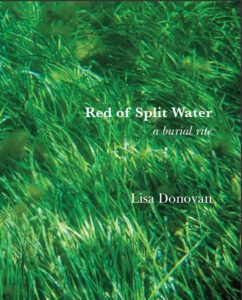
 by Lisa Donovan
by Lisa Donovan
$16.00 | October 2016
136 pgs, full color images
Red Split of Water, a burial rite – a book that is also ritual – to read (write) as ritual, one of waking, and in its two-fold sense: to come into awareness (to be born), and to keep vigil (“a sitting up at night with a corpse”). Here is a rite that allows us to, literally, fill in/enter into the blank spaces created by such waking. Within these shimmering gaps, Lisa Donovan’s constellations of violence and enduring witness are astonishing. In the places drenched by disappearances, you can hear a girl child, all through the long night, humming.
-Selah Saterstrom
“She is light, may not exist. Trees sink with the weight of glassy icicles. Are you here, little one?” Only a few pages into this emotionally epic work, and the chilling effects of this book already rank with, say, Charles Laughton’s The Night of the Hunter. This book of poetry, in various verse and prose forms, is beautiful, important, terrifying, and ultimately satisfying as few books of poems have ever managed to be.
-Bin Ramke
Lisa Donovan’s Red of Split Water: a burial rite is a fearless and graceful work of recovery and release. Her sequences are rhythmic landscapes where lyrical and prosaic forms prepare the ground: “This line of hills your clavicle, your pelvis, knees. This place not extracted is how you lend yourself to be.” Elemental forces chant warnings of and prayers for the body’s “breakdown of buoyancy; the pull you down” while “clouds drift / in and / away all / day like / this.” Line drawings interposed among the book’s five sections offer animistic filaments “wreathed around the bones” as Donovan’s coda and afterword frame harrowing portraits of survival. Red of Split Water is an astonishing invention of farewell that invokes our deepest concern for poetry’s transformative power. “What are you willing to do? To dress the [ ] figure.”
-W. Scott Howard
About the Author
 Lisa Donovan’s work has been a finalist for multiple prizes, including Kelsey St. Press’ FIRST! Poetry Prize. She holds a Ph.D. from the University of Denver’s Creative Writing Program, a M.F.A. from Brown University’s Literary Arts Program, and briefly studied at the Iowa Writer’s Workshop. Dr. Donovan currently teaches non-fiction writing to undergraduates at the University of Colorado, Boulder and to adults at the non-profit Lighthouse Writer’s Workshop in Denver. She lives in the very quaint town of Edgewater, CO where she walks her dog, Beatrice, and wonders about the life and upbringing of Nell Brinkley.
Lisa Donovan’s work has been a finalist for multiple prizes, including Kelsey St. Press’ FIRST! Poetry Prize. She holds a Ph.D. from the University of Denver’s Creative Writing Program, a M.F.A. from Brown University’s Literary Arts Program, and briefly studied at the Iowa Writer’s Workshop. Dr. Donovan currently teaches non-fiction writing to undergraduates at the University of Colorado, Boulder and to adults at the non-profit Lighthouse Writer’s Workshop in Denver. She lives in the very quaint town of Edgewater, CO where she walks her dog, Beatrice, and wonders about the life and upbringing of Nell Brinkley.

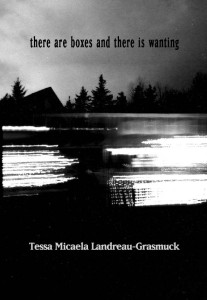
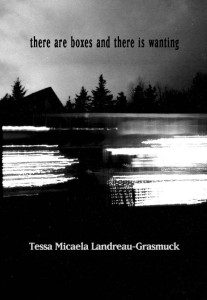 by Tessa Micaela Landreau-Grasmuck
by Tessa Micaela Landreau-Grasmuck Tessa Micaela Landreau-Grasmuck was born in Philadelphia and currently resides in Oakland with her dog, Ramona Pickle. Tessa has waited tables, bound books, worked as an abortion counselor, reproductive health educator, and birth doula, taught writing in the San Francisco county jail, studied herbalism, and carved out time to write between it all. Tessa was granted the first Community Poetics Fellowship from Mills College, where she received her MFA in 2013. Tessa is the author of the chapbook Crude Matter (ypolita press, 2015). Other writing has appeared in Make/shift, Dusie, Open House, Sink Review, and various other jars and corners. there are boxes and there is wanting is her first book.
Tessa Micaela Landreau-Grasmuck was born in Philadelphia and currently resides in Oakland with her dog, Ramona Pickle. Tessa has waited tables, bound books, worked as an abortion counselor, reproductive health educator, and birth doula, taught writing in the San Francisco county jail, studied herbalism, and carved out time to write between it all. Tessa was granted the first Community Poetics Fellowship from Mills College, where she received her MFA in 2013. Tessa is the author of the chapbook Crude Matter (ypolita press, 2015). Other writing has appeared in Make/shift, Dusie, Open House, Sink Review, and various other jars and corners. there are boxes and there is wanting is her first book.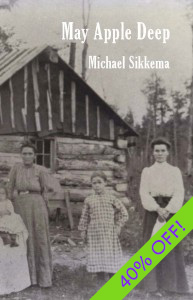
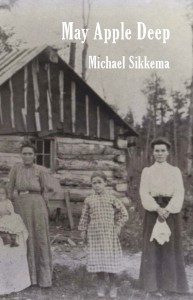 by Michael Sikkema
by Michael Sikkema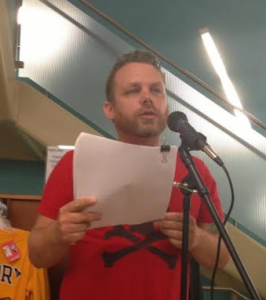 Michael Sikkema is the author of Futuring and January Found (Blazevox Books), as well as several chapbooks, most recently the forthcoming 3003 Houses (Little Red Leaves Textile Series), Time Missing (Grey Book Press), and a collaboration with Elisabeth Workman entitled Moon Poon(Pity Milk Press). He is a co-editor of Horse Less Press, the editor of Shirt Pocket Press, and co-hosts the Poetry and Pints reading series in Grand Rapids, MI with Jen Tynes.
Michael Sikkema is the author of Futuring and January Found (Blazevox Books), as well as several chapbooks, most recently the forthcoming 3003 Houses (Little Red Leaves Textile Series), Time Missing (Grey Book Press), and a collaboration with Elisabeth Workman entitled Moon Poon(Pity Milk Press). He is a co-editor of Horse Less Press, the editor of Shirt Pocket Press, and co-hosts the Poetry and Pints reading series in Grand Rapids, MI with Jen Tynes.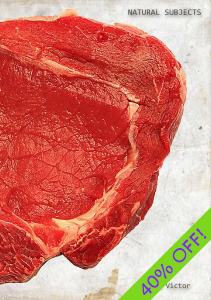
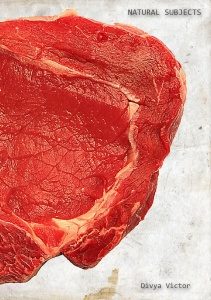 by Divya Victor
by Divya Victor Divya Victor is the author of Things To Do With Your Mouth(Les Figues, 2014), Natural Subjects (Trembling Pillow, 2014), and Unsub (Insert/Blanc, 2015). She is also author of the Partial series (Troll Thread), Punch (2011), Goodbye John! On John Baldessari (2012), and Swift Taxidermies (2014), all from Gauss PDF; and the chapbook Hellocasts by Charles Reznikoff by Divya Victor by Vanessa Place (2011). She divides her time between the United States and Singapore, where she is Assistant Professor of Poetry and Poetics at Nanyang Technological University.
Divya Victor is the author of Things To Do With Your Mouth(Les Figues, 2014), Natural Subjects (Trembling Pillow, 2014), and Unsub (Insert/Blanc, 2015). She is also author of the Partial series (Troll Thread), Punch (2011), Goodbye John! On John Baldessari (2012), and Swift Taxidermies (2014), all from Gauss PDF; and the chapbook Hellocasts by Charles Reznikoff by Divya Victor by Vanessa Place (2011). She divides her time between the United States and Singapore, where she is Assistant Professor of Poetry and Poetics at Nanyang Technological University.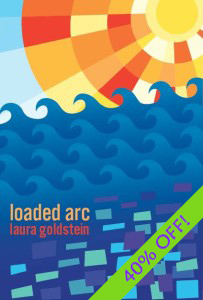
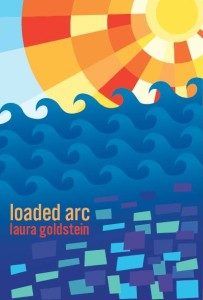 by Laura Goldstein
by Laura Goldstein Laura Goldstein has published six chapbooks as well as poetry and essays in the Denver Quarterly, American Letters and Commentary, MAKE Magazine, How2, Jacket2 and other fine publications.Laura holds degrees from the University of Pennsylvania,Temple University and the School of the Art Institute of Chicago. She teaches Writing and Literature at Loyola University and co-curates the Red Rover Series with Jennifer Karmin. She lives in Chicago with her husband, artist Brett Ian Balogh. loaded arc is her first full-length collection of poetry.
Laura Goldstein has published six chapbooks as well as poetry and essays in the Denver Quarterly, American Letters and Commentary, MAKE Magazine, How2, Jacket2 and other fine publications.Laura holds degrees from the University of Pennsylvania,Temple University and the School of the Art Institute of Chicago. She teaches Writing and Literature at Loyola University and co-curates the Red Rover Series with Jennifer Karmin. She lives in Chicago with her husband, artist Brett Ian Balogh. loaded arc is her first full-length collection of poetry.